The Specific Protein Testing Market is estimated to be valued at USD 7.6 billion in 2025 and is projected to reach USD 16.7 billion by 2035, registering a compound annual growth rate (CAGR) of 8.2% over the forecast period.
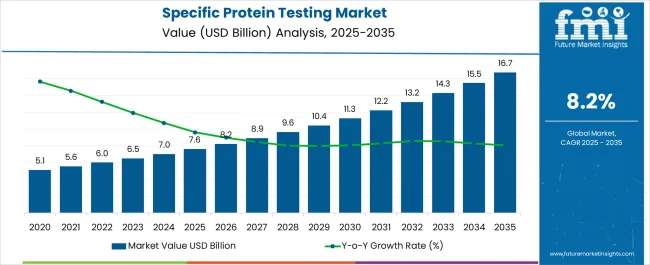
| Metric | Value |
|---|---|
| Specific Protein Testing Market Estimated Value in (2025 E) | USD 7.6 billion |
| Specific Protein Testing Market Forecast Value in (2035 F) | USD 16.7 billion |
| Forecast CAGR (2025 to 2035) | 8.2% |
The Specific Protein Testing market is experiencing strong growth, driven by increasing demand for precise diagnostic solutions in clinical and research settings. Rising prevalence of chronic diseases, cardiovascular disorders, and metabolic conditions is creating a critical need for protein-based biomarkers that can provide accurate disease detection and risk assessment. Technological advancements in immunoassays, mass spectrometry, and high-sensitivity analytical platforms are enhancing the reliability and throughput of protein testing, supporting broader clinical adoption.
The market is also being fueled by the growing focus on personalized medicine, where protein testing enables patient-specific therapeutic strategies and monitoring of treatment efficacy. Increased investments in healthcare infrastructure, laboratory automation, and clinical research facilities are further supporting expansion.
Regulatory emphasis on standardization, data accuracy, and laboratory compliance is driving adoption of validated protein testing protocols As hospitals, diagnostic centers, and research laboratories seek scalable and efficient testing solutions, the Specific Protein Testing market is expected to sustain growth, with innovations in assay development, sample processing, and analytical precision underpinning future opportunities.
The specific protein testing market is segmented by application, product type, sample type, analysis mode, end user, and geographic regions. By application, specific protein testing market is divided into Hematology, Cardiovascular Diseases, Inflammatory Diseases, Kidney Diseases, Genetic Diseases, Cancer, Immunity, Clinical Research, and Other. In terms of product type, specific protein testing market is classified into Apolipoprotein E, Apolipoprotein C-II, Cystatin C, Apolipoprotein C-III, Microalbumin, and Reagents. Based on sample type, specific protein testing market is segmented into Blood, Urine, Brain Cells, and Nucleic Acid. By analysis mode, specific protein testing market is segmented into Immunoassay, Biochemistry, Optical, Latex Agglutination, and Molecular Biology. By end user, specific protein testing market is segmented into Hospital, Biotechnology Companies, Diagnostic Laboratories, and Research Centers. Regionally, the specific protein testing industry is classified into North America, Latin America, Western Europe, Eastern Europe, Balkan & Baltic Countries, Russia & Belarus, Central Asia, East Asia, South Asia & Pacific, and the Middle East & Africa.
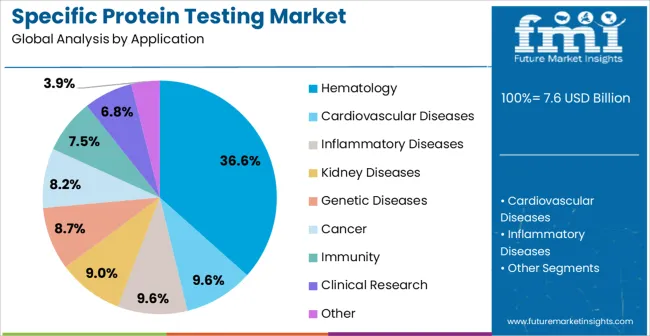
The hematology application segment is projected to account for 36.6% of the market revenue in 2025, making it the leading application area. Growth in this segment is being driven by the increasing utilization of protein biomarkers for diagnosing blood disorders, monitoring disease progression, and guiding therapeutic interventions.
Hematology testing relies on high-precision assays to detect variations in specific proteins that are indicative of pathological conditions, supporting early diagnosis and clinical decision-making. Advances in assay sensitivity, throughput, and automation have enhanced laboratory efficiency, allowing for rapid and reliable protein quantification in large patient populations.
Integration of hematology testing with laboratory information systems and electronic medical records further facilitates streamlined workflows, compliance, and data management As demand grows for timely and accurate blood analysis in clinical and research settings, hematology applications are expected to maintain leadership, supported by the adoption of novel biomarkers and continuous improvements in assay technologies and analytical platforms.
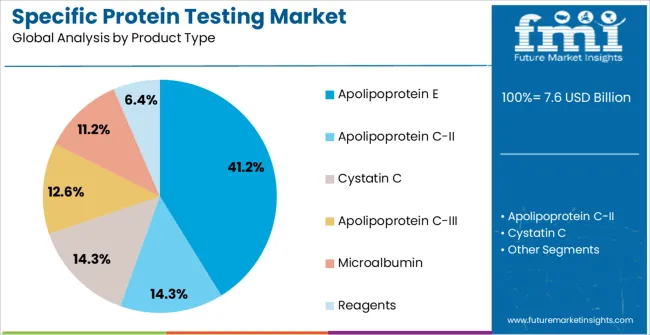
The Apolipoprotein E product type segment is anticipated to hold 41.2% of the market revenue in 2025, establishing it as the leading product type. This segment’s growth is driven by its critical role in lipid metabolism assessment, cardiovascular risk evaluation, and neurodegenerative disease studies. Apolipoprotein E testing enables precise risk stratification, therapeutic monitoring, and research into disease mechanisms, enhancing its clinical and research utility.
Technological advancements in ELISA, mass spectrometry, and high-throughput protein quantification platforms have improved assay accuracy and reproducibility, strengthening market adoption. Integration with clinical decision support systems allows healthcare providers and researchers to interpret results efficiently, facilitating personalized patient care and evidence-based research.
Rising awareness of cardiovascular health, lipid management, and Alzheimer’s disease risk has further increased demand As healthcare institutions and research laboratories seek reliable and scalable protein testing solutions, the Apolipoprotein E segment is expected to retain its market leadership, supported by ongoing innovation in analytical methodologies and biomarker discovery.
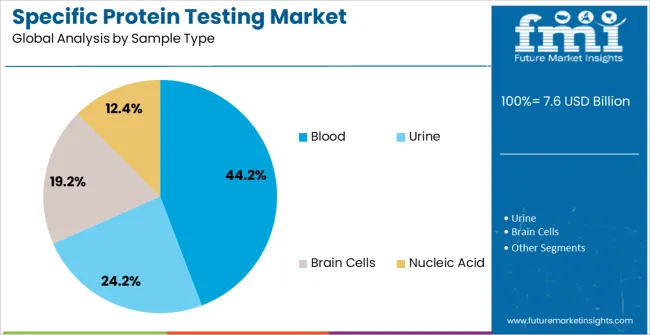
The blood sample type segment is expected to account for 44.2% of the market revenue in 2025, positioning it as the leading sample category. Growth is driven by the accessibility, reliability, and clinical relevance of blood as a diagnostic matrix for protein testing. Blood samples provide comprehensive information about systemic protein levels, enabling accurate disease diagnosis, therapeutic monitoring, and biomarker validation.
High adoption is supported by standardized collection procedures, widespread laboratory infrastructure, and compatibility with automated and high-throughput analytical platforms. Advancements in sample preparation, stability, and preservation techniques have improved reliability and reproducibility of protein testing results.
The blood sample type is preferred in clinical and research applications due to its ability to reflect dynamic physiological changes and enable longitudinal monitoring As laboratories and healthcare providers continue to demand scalable and efficient sample testing solutions, the blood sample segment is expected to maintain its leading position, driven by technological innovations and increasing clinical and research utilization of protein biomarkers.
Specific protein testing are important markers for various diseases including microbial infections, cardiac risk, inflammatory response and even cancer. The complement system is a family of proteins that is essential for the destruction of bacteria, and viruses and is a most important part of the immune system.
The measurement of proteins in the body assists in the evaluation and diagnosis of various conditions. The immunoturbidimetric kits for the study and research over the wide range of specific proteins includes unique products such as Apolipoprotein E, Apolipoprotein C-II, Cystatin C, Apolipoprotein C-III and Microalbumin.
The specific protein testing monitors and helps in the diagnosis of the performance of immunology parameters and serum proteins including ASO, CRP, RF, Immunoglobulin and Complement Proteins. Three flexible size options are available to help reduce waste and costs.
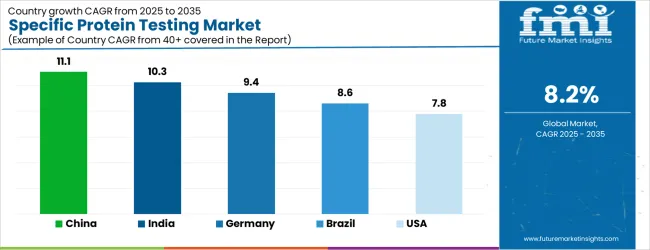
| Country | CAGR |
|---|---|
| China | 11.1% |
| India | 10.3% |
| Germany | 9.4% |
| Brazil | 8.6% |
| USA | 7.8% |
| UK | 7.0% |
| Japan | 6.2% |
The Specific Protein Testing Market is expected to register a CAGR of 8.2% during the forecast period, exhibiting varied country level momentum. China leads with the highest CAGR of 11.1%, followed by India at 10.3%. Developed markets such as Germany, France, and the UK continue to expand steadily, while the USA is likely to grow at consistent rates. Japan posts the lowest CAGR at 6.2%, yet still underscores a broadly positive trajectory for the global Specific Protein Testing Market. In 2024, Germany held a dominant revenue in the Western Europe market and is expected to grow with a CAGR of 9.4%. The USA Specific Protein Testing Market is estimated to be valued at USD 2.7 billion in 2025 and is anticipated to reach a valuation of USD 2.7 billion by 2035. Sales are projected to rise at a CAGR of 0.0% over the forecast period between 2025 and 2035. While Japan and South Korea markets are estimated to be valued at USD 381.5 million and USD 236.3 million respectively in 2025.
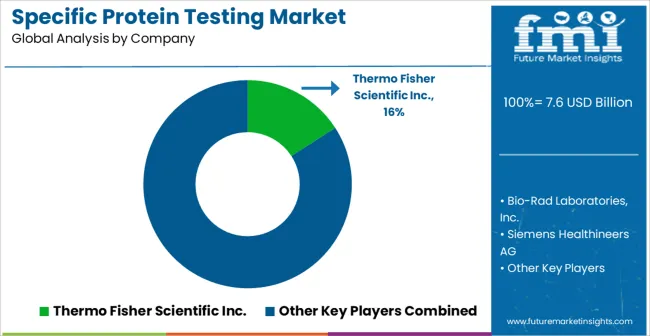
| Item | Value |
|---|---|
| Quantitative Units | USD 7.6 Billion |
| Application | Hematology, Cardiovascular Diseases, Inflammatory Diseases, Kidney Diseases, Genetic Diseases, Cancer, Immunity, Clinical Research, and Other |
| Product Type | Apolipoprotein E, Apolipoprotein C-II, Cystatin C, Apolipoprotein C-III, Microalbumin, and Reagents |
| Sample Type | Blood, Urine, Brain Cells, and Nucleic Acid |
| Analysis Mode | Immunoassay, Biochemistry, Optical, Latex Agglutination, and Molecular Biology |
| End User | Hospital, Biotechnology Companies, Diagnostic Laboratories, and Research Centers |
| Regions Covered | North America, Europe, Asia-Pacific, Latin America, Middle East & Africa |
| Country Covered | United States, Canada, Germany, France, United Kingdom, China, Japan, India, Brazil, South Africa |
| Key Companies Profiled | Thermo Fisher Scientific Inc., Bio-Rad Laboratories, Inc., Siemens Healthineers AG, Abbott Laboratories, Danaher Corporation, Roche Diagnostics, PerkinElmer, Inc., Agilent Technologies, Inc., Becton, Dickinson and Company, DiaSorin S.p.A., Sysmex Corporation, and Ortho Clinical Diagnostics |
The global specific protein testing market is estimated to be valued at USD 7.6 billion in 2025.
The market size for the specific protein testing market is projected to reach USD 16.7 billion by 2035.
The specific protein testing market is expected to grow at a 8.2% CAGR between 2025 and 2035.
The key product types in specific protein testing market are hematology, cardiovascular diseases, inflammatory diseases, kidney diseases, genetic diseases, cancer, immunity, clinical research and other.
In terms of product type, apolipoprotein e segment to command 41.2% share in the specific protein testing market in 2025.






Our Research Products

The "Full Research Suite" delivers actionable market intel, deep dives on markets or technologies, so clients act faster, cut risk, and unlock growth.

The Leaderboard benchmarks and ranks top vendors, classifying them as Established Leaders, Leading Challengers, or Disruptors & Challengers.

Locates where complements amplify value and substitutes erode it, forecasting net impact by horizon

We deliver granular, decision-grade intel: market sizing, 5-year forecasts, pricing, adoption, usage, revenue, and operational KPIs—plus competitor tracking, regulation, and value chains—across 60 countries broadly.

Spot the shifts before they hit your P&L. We track inflection points, adoption curves, pricing moves, and ecosystem plays to show where demand is heading, why it is changing, and what to do next across high-growth markets and disruptive tech

Real-time reads of user behavior. We track shifting priorities, perceptions of today’s and next-gen services, and provider experience, then pace how fast tech moves from trial to adoption, blending buyer, consumer, and channel inputs with social signals (#WhySwitch, #UX).

Partner with our analyst team to build a custom report designed around your business priorities. From analysing market trends to assessing competitors or crafting bespoke datasets, we tailor insights to your needs.
Supplier Intelligence
Discovery & Profiling
Capacity & Footprint
Performance & Risk
Compliance & Governance
Commercial Readiness
Who Supplies Whom
Scorecards & Shortlists
Playbooks & Docs
Category Intelligence
Definition & Scope
Demand & Use Cases
Cost Drivers
Market Structure
Supply Chain Map
Trade & Policy
Operating Norms
Deliverables
Buyer Intelligence
Account Basics
Spend & Scope
Procurement Model
Vendor Requirements
Terms & Policies
Entry Strategy
Pain Points & Triggers
Outputs
Pricing Analysis
Benchmarks
Trends
Should-Cost
Indexation
Landed Cost
Commercial Terms
Deliverables
Brand Analysis
Positioning & Value Prop
Share & Presence
Customer Evidence
Go-to-Market
Digital & Reputation
Compliance & Trust
KPIs & Gaps
Outputs
Full Research Suite comprises of:
Market outlook & trends analysis
Interviews & case studies
Strategic recommendations
Vendor profiles & capabilities analysis
5-year forecasts
8 regions and 60+ country-level data splits
Market segment data splits
12 months of continuous data updates
DELIVERED AS:
PDF EXCEL ONLINE
Antibody Specificity Testing Market Size and Share Forecast Outlook 2025 to 2035
Prostate-Specific Antigen Testing Market Analysis - Size, Share & Forecast 2025 to 2035
Pancreatic Stone Protein Testing Market Growth - Trends & Forecast 2024 to 2034
Protein-Coating Line Market Forecast Outlook 2025 to 2035
Protein Labelling Market Size and Share Forecast Outlook 2025 to 2035
Protein Puddings Market Size and Share Forecast Outlook 2025 to 2035
Protein/Antibody Engineering Market Size and Share Forecast Outlook 2025 to 2035
Protein Expression Market Size and Share Forecast Outlook 2025 to 2035
Protein Purification Resin Market Size and Share Forecast Outlook 2025 to 2035
Protein Hydrolysate For Animal Feed Application Market Size and Share Forecast Outlook 2025 to 2035
Protein Crisps Market Outlook - Growth, Demand & Forecast 2025 to 2035
Protein Hydrolysate Market Size and Share Forecast Outlook 2025 to 2035
Protein Supplement Market - Size, Share, and Forecast 2025 to 2035
Protein Powder Market Analysis - Size, Share, and Forecast Outlook 2025 to 2035
Protein Purification and Isolation Market Insights – Size, Share & Forecast 2025 to 2035
Protein Ingredients Market Analysis - Size, Share, and Forecast 2025 to 2035
Protein A Resins Market Trends, Demand & Forecast 2025 to 2035
Proteinase K Market Growth - Trends & Forecast 2025 to 2035
Specific Imaging Solution Market Insights – Demand and Growth Forecast 2025 to 2035
Proteinuria Treatment Market Insights – Demand & Forecast 2025 to 2035

Thank you!
You will receive an email from our Business Development Manager. Please be sure to check your SPAM/JUNK folder too.
Chat With
MaRIA